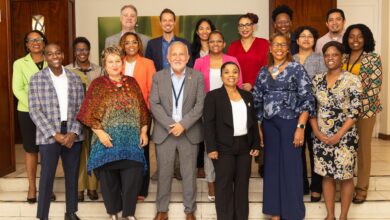We, the representatives of the Fifteen States of the Caribbean Community (CARICOM),
Having met in Pétion Ville on 5 and 6 December 2013 for the High Level Ministerial Meeting on the Rights of Persons with Disabilities;
Recalling the decision of the Heads of Government of the Caribbean Community, meeting in July 2013, that priority attention be given to the concerns of persons with disabilities;
Reiterating our commitment to implementation of the Kingston Accord on the Responsibilities of States with respect to Persons with Disabilities, the United Nations Convention on the Rights of Persons with Disabilities and the Inter-American Convention on the Elimination of all Forms of Discrimination against Persons with Disabilities, in accordance with the Constitution and laws of our respective member states;
Reaffirming the universality, indivisibility and interdependence of all human rights, including the right to development;
Recognising the need for us to build societies based on social cohesion and inclusion in which all persons, including those with disabilities enjoy the privileges and fundamental freedoms which are their human right;
Determined, in this regard, to enhance national and regional policies and to strengthen legislative frameworks that promote the social services and protection by which persons with disabilities have the opportunity to achieve their full individual potential and to participate meaningfully in the life of their communities;
Do Hereby Declare:
- We agree to address with renewed energy and dedication the development of legal frameworks at the national level to give effect to the commitments we have made through our adherence to international and regional instruments to promote and protect the rights and needs of persons with disabilities, and call on those countries which have not yet done so, to sign and ratify the relevant instruments, in particular the UN Convention on the Rights of Persons with Disabilities and the Inter-American Convention on the Elimination of all Forms of Discrimination against Persons with Disabilities;
- We are determined to continue efforts being made to build inclusive societies for both present and future generations, and recognize the important contribution, both existing and potential, that persons with disabilities can make towards enriching the diversity of our societies. In this regard we resolve to proceed in partnership with all stakeholders at the national level, particularly community groups, including organizations of persons with disabilities, civil society and the private sector, in our effort to mainstream disability issues into national development strategy, so as to assure the contribution of all citizens in the promotion of inclusive societies free from discrimination;
- We acknowledge the importance to persons with disabilities of their right to autonomy and independence, including their freedom to make their own choices, and agree to ensure that they have the opportunity to be actively involved in decision-making processes on legislation, policies and programmes, particularly those directly concerning their interests; and to provide the necessary human, financial and technical resources to support the strengthening of programmes dedicated to the interests of persons with disabilities;
- We resolve to take the necessary steps towards building a physical and social environment that promotes the habilitation, rehabilitation and integration of persons with disabilities, taking into account issues with respect to their access to facilities open to the public including buildings, transportation, and other public social and health services, including counseling and access to reproductive health care and services, while also promoting their equal opportunity to education and employment;
- We recognize in particular the unique vulnerability of women and girls with disabilities who are often more exposed to violence, abuse, mistreatment and discrimination, both within and outside of the home, and agree to pay attention to their protection and special needs in accessing healthcare, training and employment, supporting their efforts to gain greater independence and respect in their communities, and to achieve a more fulfilling lifestyle;
- We are resolved to pay attention to the needs of men and boys with disabilities, particularly in respect of education, training, health and employment opportunities and will address in our development policies and programmes, strategies to enhance and support the continued independence, productivity and well-being of men and boys with disabilities.
- We are committed to promoting within our homes, schools and communities a greater awareness of the needs of children and youth with disabilities, and agree to develop and implement measures to ensure continued improvement in the home, the school and the community that assures their equal right to education and participation; that improves also their access to social services and support, employment opportunities, sports, recreation and cultural activities, thereby promoting inclusion while supporting their aspirations to become productive citizens of their communities;
- We are resolved to give greater attention to the needs of older persons with disabilities, and to integrate in our development planning of policies and programmes that prepare our societies to support the continued independence, productivity and well-being of our aging populations, acknowledging the increased prevalence of disability that accompanies older age;
- We are convinced that the family which is a fundamental unit of society is entitled to the protection of society and the state, and that persons with disabilities and their immediate family/household should receive assistance to ensure the full and equal enjoyment of the rights of persons with disabilities;
- We agree to support the exploration and provision of the use of assisted technology, particularly information and communication technologies to enhance the access of persons with disabilities to information, education, employment and services;
- We call for continued, urgent attention to be given to the use of evidenced based best practice in the planning and monitoring of policies and programmes on disability at both the national and regional levels.
- We resolve to establish a common definition of disability and to develop and implement a common framework for national and regional data collection, to promote the standardization of measurement of our progress in addressing the needs of persons with disabilities;
- We resolve to work in solidarity and partnership with Member states through regional cooperation as we jointly seek solutions to the challenges faced by persons with disabilities in the Caribbean region, so as to achieve the goals of this Declaration;
- We affirm with appreciation the indispensable support of the regional and international organizations and partners who are committed to work with us in pursuing this important agenda;
- We agree to establish a mechanism to ensure biennial monitoring and assessment of progress.
- We also propose the appointment of a CARICOM Rapporteur on Disability, and the creation of a network for regular consultation among representatives of the regional community working in the interest of persons with disabilities.
- We resolve to embrace fully the provisions of the Kingston Accord of 2004 to guide the substantive implementation of this Declaration.
- No element of this Declaration shall be construed as impairing, contradicting or restricting the provisions of the Constitution of any state, its laws, or any international or regional instrument adopted, nor constitute a waiver of such instruments.
Done this day, Friday, December 6, 2013, at Petion Ville, Haiti.





